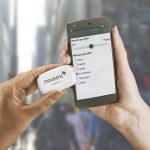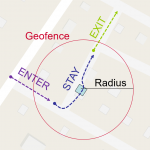Ambulatory Assessment and Mobile Monitoring
Ambulatory Assessment (AA) comprises the use of field methods to assess the ongoing behavior, physiology, experience and environmental aspects of people in naturalistic or unconstrained settings. AA uses ecologically-valid tools to understand biopsychosocial processes as they unfold naturally in time and in context.

Recommendations for Ambulatory Assessment with technologies and devices of movisens
Ambulatory Assessment covers a range of real-time data capture methodologies that originate from different scientific disciplines (psychology, medicine, computer science, etc.).
Experience Sampling with movisensXS
movisensXS provides a complete solution for smartphone based experience sampling (ESM). Whether Interactive Ambulatory Assessment (IAA), Ecological Momentary Assessment (EMAs) or Ecological Momentary Interventions (EMIs), with movisens you’ll realize innovative research ideas and capture insightful data at the right time, in real time and in everyday life.
Comprising of an intuitive and easy to use web platform and an App for Android smartphones or tablets, movisensXS allows the mobile acquisition of questionnaires, triggered by customisable sampling schemas. Inside the web platform you can create questionnaires and sampling schemes using our simple drag and drop interface. A complete study management suite with no programming skills required!

Ecological Momentary Assessment
The sensors available within the smartphone can be used for different questions. For example, the internal acceleration sensor allows a rough estimate of physical activity.
Whilst Physical Activity cannot be measured accurately with a Smartphone, it can provide a very broad estimate of the amount of overall movement within a specified timeframe. Smartphone accelerometers lack the accuracy and uniformity of a dedicated activity tracker. To accurately measure activity please use a dedicated research quality activity sensor like the movisens Move 4.

Physiological Monitoring
movisens sensors provide insights into physical activity, the 24hour Activity cycle, sleep, and the state of the Autonomic Nervous System. Our ability to capture high quality long term ambulatory physical data via a broad range of physiological signals allows researchers to investigate participants behaviour at a level of detail and fidelity previously not possible.

Interactive Ambulatory Assessment
movisens sensors provide physiological data to movisensXS, enabling a unique capability to trigger questionnaires when they matter most. movisensXS evaluates the data within your customisable algorithm, and as a result of the evaluation, can trigger a questionnaire or an intervention on the smartphone. This feature allows you to capture the contextual information from a participant, enabling you to fully understand the objective physiological data. Instead of looking at the data and wondering what that spike or dip was in a particular metric, you can use this feature to ask the participant themselves at the moment it occurs.

Mobile Sensing for Interactive Ambulatory Intervention
Mobile sensing uses the sensors of a mobile device to acquire data from the environment. Modern Smartphones contain a range of that monitor a diverse range of human activities and commonly encountered contexts. movisens provides researchers easy access to the Mobile Sensing features of smartphones. The mobile sensing capabilities also enable the precise delivery of interventions. Researchers can determine the optimal time for an outpatient intervention or to adapt the intervention to the situation.

Example studies
IMMERSE:
The EU project "IMMERSE" aims to advance the transformation of mental health care in Europe into true person-centered care, focusing on the needs of each individual seeking help for mental health problems, while giving them an active role in their treatment process and decision-making. o achieve this, IMMERSE decided to implement the Experience Sampling Methodology (ESM) and integrate ESM into an innovative clinical digital health tool. This Digital Mobile Mental Health (DMMH) platform consists of an ESM app, assessing self-reports of mental state in everyday life, a data analysis platform that processes the data, and a dashboard for visualization and feedback.
INTEGRATION :
Supportive measures such as nutrition or physical activity during cancer treatment are becoming more and more important. Therefore, we're very happy to be part of the "INTEGRATION" which evaluates a treatment approach for ambulatory cancer therapy. The project is managed by the Uniklinik Köln and being carried out at eleven major German hospitals. The results will contribute to further elucidation of the synergistic effects of physical activity and nutritional therapy as supportive measures during cancer treatment.
PEZ-Study:
The ZI (Zentralinstitut für Seelische Gesundheit) Mannheim conducts the "PEZ Study" on the effect of environmental factors on well-being and mental health. The PEZ study examines the relationships between environmental conditions, everyday stressors and personality traits in order to identify mechanisms that make people resistant or susceptible to mental illness over the long term. With the help of mobile devices, everyday movement patterns on satellite-supported maps are determined and combined with movisensXS smartphone questions to determine the state of mind in everyday life. Tissue sample analysis and imaging methods contribute to this large ambulatory assessment project. The Mobile Sensing features featured in this project are location, activity type, steps and trigger when environmental parameters changed (noise, population density, vegetation).
Student projects:
We support students with innovative ideas through the loan of our sensors for a limited time and/or free credits on our experience sampling platform - movisensXS. Every successfully completed student project can take part in our competition for "Student Project of the Year Award".
Assessment of the circadian stimulus potential of an integrative lighting system in an office area
Teachers’ ambulatory heart rate variability as an outcome and moderating variable in the job demands-resources model
Associations among affect, diet, and activity and binge-eating severity using ecological momentary assessment in a non-clinical sample of middle-aged fathers
Useful Information
Mobile Monitoring (MoMo) is a collective term for time-limited monitoring by means of mobile technical aids. Mobile stands for movable and mobile as well as for mobile communication. Mobile monitoring supports scientists in monitoring participants and provides information about their actions and traits.
Ambulatory Assessment (AA) covers a wide range of assessment methods to study people in their natural environment, including self-report, observational, and biological/physiological/behavioral. AA methods minimize retrospective biases while gathering ecologically valid data from patients’ everyday life in real time or near real time.

Literature
Mobile Phone Sensing in Scientific Research; Bo Liu and A. Bulent Koc; 2015.
Timothy J. Trull & Ulrich Ebner-Priemer (2013). Annu Rev Clin Psychol; 9: 151–176.